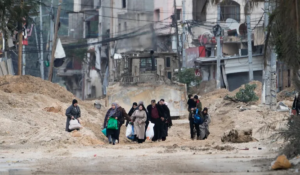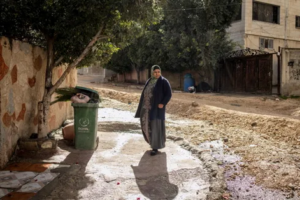Israeli army operations drive 30,000 Palestinians from West Bank refugee camps

Residents of the West Bank refugee camp of Nur Shams, Tul Karm, evacuate their homes as the Israeli military continues its operation in the area on 11 February 2025
Hagar Shezaf and Jack Khoury report in Haaretz on 15 February 2025:
Some 30,000 Palestinians have evacuated refugee camps in the northern West Bank following Israeli military operations in the area, which have been ongoing for more than three weeks, sources in the Palestinian Authority say.
Despite ongoing operations, the IDF claims it has no displacement policy. However, eyewitness accounts from Jenin and Tul Karm indicate that Israeli forces are directly or indirectly causing residents to flee in massive numbers. They are also forced to stay away for longer periods of time compared to previous operations.
The governor of the Tul Karm district, Abdullah Kamil, told Haaretz he estimates that some 15,000 residents have fled the Tul Karm and Nur Shams refugee camps. Army operations have led to the displacement of residents through “destruction, threats, shooting and the presence of snipers,” he said. “The soldiers used the mosques’ loudspeakers to tell residents they had to evacuate the camps for safety reasons due to the military operation.” Kamil said 16 refuge centers across the district are sheltering many of the displaced Tul Karm residents.
The commander of the Israel Defense Forces’ Ephraim Brigade, Col. N., partially confirmed Kamil’s account. He told Haaretz during a tour with reporters that the army is indeed evacuating residents where fighting is occurring in the Tul Karm refugee camp. The army launched Operation Iron Wall on January 21 to fight armed groups whose power in the camps had grown in recent years.
Kamil says he believes the operation has nothing to do with October 7, as Israelis claim. “The attack focused from the start on UNRWA, which is one of the two main witnesses to the historic crime Israel has committed against the Palestinians and the creation of the refugee problem,” he said. His take echoes the narrative common among West Bank Palestinians, who see the army operations as an attempt to liquidate the refugee camps.
Some 50 kilometers (30 miles) to the northeast, a situation similar to what Kamil describes prevails in Jenin. Many residents of the refugee camp and adjacent neighborhoods already fled during a Palestinian Authority operation in December. Others fled during the Israeli army operation there in recent weeks.

A Palestinian woman looks at a road destroyed by Israeli forces during a large scale military operation in east Jenin city, 13 February 2025
Jenin mayor Mohammad Jarrar told Haaretz that 16,000 residents have been driven from their homes. “You can’t compare this operation to its predecessors,” he said. “In the past, people were displaced for a few days, but this is different. There’s destruction in the camp and an attempt to make the displacement permanent.”
The military operation is palpably impacting civilian infrastructure in the camps. The army has destroyed many roads, and soldiers intentionally blew up homes in Jenin. Jarrar says the operation has affected Jenin’s government hospital, located at one of the entrances to the refugee camp. He said roads leading to it have been destroyed, and the army has placed a checkpoint at its entrance. He noted that the army cut off electricity to the hospital for the operation’s first week, and the water supply has been intermittent.
The army distributed flyers in the Jenin refugee camp in recent days tying the massive displacement of residents with reining in armed militants. One side portrays open shops with a message conditioning local economic growth and potential prosperity on residents’ disassociation from armed militants.
The other side showed pictures of uprooted residents with the message: “Jenin refugee camp residents, this is how your lives will be in the shadow of the criminals of the Katiba,” referring to the nickname of the Jenin Brigade. “If you don’t disassociate from them, security forces will continue to operate forcefully, and you will suffer from a fight that isn’t yours.”
UNRWA estimated this week that the operation in the northern West Bank has displaced 40,000 refugee camp residents. The estimate is based on the number of registered residents and not on the number actually living there. In addition to Jenin and Tul Karm, UNRWA’s statement also referred to military operations in the Far’a refugee camp near Tubas, which has also led to residents fleeing.
UNRWA stated that the army’s repetitive operations in the area have made the local refugee camps uninhabitable. It said residents are dealing with being repeatedly displaced due to air strikes, destruction of infrastructure and targeted explosions that have become routine. UNRWA said that the PA operation in Jenin also impacted residents’ lives and led to substantial displacement.
The army rejected the allegations about evacuating West Bank residents. The IDF Spokesperson’s Unit said in a statement that “The army lets locals interested in moving away from battle sites to leave safely. The departure is carried out via special passages secured by our forces.”
This article is reproduced in its entirety
